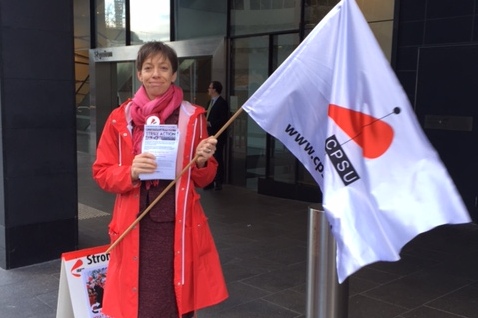Signs are emerging the Abbott government is preparing to change tack in its fruitless year-long dispute with the Community and Public Sector Union over deadlocked enterprise bargaining negotiations.
The Commonwealth’s main public sector union on Thursday revealed it believes that agency chiefs and their negotiators have finally been given extra latitude in their bargaining instructions to be able keep the hallowed 15.4 per cent employer superannuation contribution guarantee enshrined in new enterprise agreements, a move that could remove a major roadblock to real talks commencing.
“The union understands that new Public Service Commissioner John Lloyd yesterday advised chief negotiators of Commonwealth agencies that they are no longer required to remove references to the 15.4 per cent superannuation guarantee from agreements,” the CPSU said.
The CPSU’s National Secretary Nadine Flood immediately pounced on the change as a major backdown from the government and a victory for the union’s dogged stand against what most members see as an attempt to cut workplace conditions and entitlements in addition to curbing the union’s presence in federal agencies.
“This is a significant move because superannuation is such a critical issue. Public servants were simply not prepared to give control of protecting their retirement income to Ministers Abetz and Cormann,” Ms Flood said.
“This is a rare win for common-sense over ideology, but the CPSU’s fight to protect other rights and conditions threatened by Minister Abetz’s harsh bargaining regime is far from over.”
Much of that common sense appears to be coming at the instigation of Mr Lloyd, a seasoned industrial negotiator who has exhibited a more practical and less dogmatic stance towards securing a new enterprise agreement.
The apparent revelation of the change in position has also conveniently come as a curtain raiser to his second significant public appearance before public servants at a forum in Canberra slated for early on Friday morning where he will share the stage with Ms Flood during a seminar co-hosted by the UNSW Canberra School of Business and the Australian Labour and Employment Relations Association (ACT).
Titled “Public Sector Bargaining in a Time of Austerity” the debate, deliberately or otherwise, has managed to take on an ominously Greek theme after it was booked into Canberra’s Hellenic Club as the venue.
The choice of location has already set tongues wagging in senior APS ranks that Mr Lloyd appears to have a particularly dry wit which he is prepared to wield when dealing with both the APS and unions.
Hopes are clearly high that what has become a morale sapping dispute will finally progress.
After the sacrosanct issue of superannuation — which is regarded by many senior managers as one of the most effective ways to entice private sector talent into the APS — the government’s highly prescriptive and controversial definition of productivity is expected to be the next hardline position to bend.
Under the present APSC bargaining framework the effective definition of productivity as applied has been an increase in working hours in return for offsets in the form of pay rises – a stance that in reality is a labour cost saving rather than an increase in output using the same or fewer resources.
Many senior public servants are known to privately loathe the stance because they believe it has set them up to fail because they cannot factor in increases in output through other means such as streamlining processes or the greater application technology, especially as it relates to service delivery.
Parts of the Coalition backbench and some senior ministers are also believed to be cool on the definition, especially how it could translate to the wider industrial relations discussion.
A tangible fear in parts of the Senior Executive Service and industry is what one informed source referred to as a “Dickensian” message that risked thwarting innovation and entrenching siloed, risk averse behaviour that had left government well behind the private sector in terms of its flexibility and ability to respond to change imperatives.
One minister many senior public servants are keeping a permanent watch on is Communications Minister Malcolm Turnbull who will on Friday afternoon finally take the covers off the government’s Digital Transformation Office that has been tasked getting agencies to bake-in online delivery of their activities from the outset.
So far Mr Turnbull has been selling the new DTO as having a ‘start-up’ culture that will allow the government to rapidly prototype and test new ideas and delivery channels to force the pace of digital change.
The DTO has also secured the prominent backing, for the time being at least, of Prime Minister Tony Abbott who has been left in the shade in terms of service innovation compared to state government like New South Wales which have made major inroads reforming everything from licensing and transport ticketing to government procurement using new models now in place in the USA and Britain.
It is understood that part of the trade-off for allowing the DTO to meddle in the affairs of other agencies is the conscious pursuit of ‘contestability’ where established processes ripe for improvement can be challenged both from within the public service and from private industry.
A key focus remains automation and enabling digital transactions, such as long running efforts to reduce the number of costly ‘touch points’ for interactions with government whether they be applying for benefits or obtaining data from the government or giving it to agencies.
One recently departed senior public servant told Government News that the time immediately following the biggest APS jobs cull since the Howard era was a prime opportunity to usher in systemic change because “the cement is still wet” in terms work practices and allegiances.
However the former senior official cautioned some agencies could resist what they saw as interference on the technology front because it could expose shortcomings and inefficiencies.
“Technology is power” the source said, adding that no manager or head would ever willingly accept the imposition of a new system that put their organisation’s operations and reputation — and their careers — at risk.
Comment below to have your say on this story.
If you have a news story or tip-off, get in touch at editorial@governmentnews.com.au.
Sign up to the Government News newsletter


